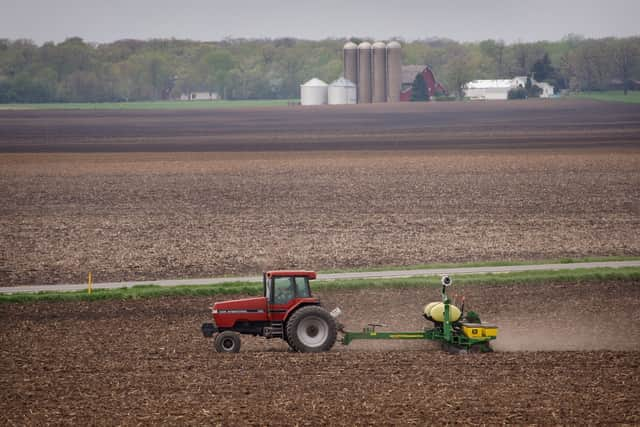‘Shocking’ pesticide linked to rising cancer rates increasing in UK farming
and live on Freeview channel 276
A pesticide that is linked to rising cancer rates and biodiversity loss is increasingly being used in UK farming, new figures show.
Official UK government data reveal that the use of glyphosate in UK farming has increased by more than 360 tons (16%) between 2016 and 2020.
Advertisement
Hide AdAdvertisement
Hide AdThe area of land sprayed with the pesticide increased by 9% or 230,000 hectares - 3.5 times the size of Greater Manchester.
The “shocking” figures come despite the fact the government recently promised to “reduce reliance on the use of conventional chemical pesticides”.
The weedkiller, glyphosate, has been classified by the World Health Organization as a “probable human carcinogen” and has been the subject of numerous US court cases, resulting in the manufacturer paying out billions of dollars in compensation to cancer-sufferers.
It has also been found to cause harm to bees and other wildlife and regularly contaminates water, posing a potential risk to both aquatic life and human health.
Advertisement
Hide AdAdvertisement
Hide AdNick Mole, Policy Officer at Pesticide Action Network UK (PAN UK), said it is “crazy that we continue to endanger the health of rural residents, farmworkers and wildlife when there are plenty of safer and more sustainable alternatives available.”


He added: “These latest figures, while shocking, are actually a huge underestimation of our exposure to glyphosate since they only relate to farming. Meanwhile, glyphosate is also sprayed liberally in most UK towns and cities”.
PAN UK’s own analysis has also found that the use of other Highly Hazardous Pesticides has increased between 2016 and 2020.
The amount of 2,4-D (herbicide), a possible carcinogen, used in UK farming rose by 117% between 2016 and 2020, while the amount of imazalil (fungicide) increased by 53%. Imazalil has links to cancer and is classified as a “developmental or reproductive toxin” which means that it can negatively affect sexual function and fertility.
Advertisement
Hide AdAdvertisement
Hide AdThe data further revealed that several insecticides that are highly-toxic to bees remain in use in the UK, including cyantraniliprole and lambda-cyhalothrin. The use of these insecticides increased by more than 240% between 2016 and 2020.
Despite the increase in use of harmful pesticides the average kilogram of pesticide used per hectare of land has largely remained the same.
Mr Mole explains that when taking “a closer look at the figures” they reveal that “intensity has stayed fairly static”.
He said: “This means that humans and wildlife living in and around conventional farms are likely to be exposed to a similar toxic load.”
Advertisement
Hide AdAdvertisement
Hide AdHe demanded that the UK must “move further and faster” to “transition away from chemical dependence and towards more nature-friendly methods of production” as the UK is “already one of the most nature-depleted countries in the world”.
PAN UK is also calling on the government to improve its pesticide usage monitoring and data as it spotted problems with its figures including numbers being changed retroactively and discrepancies between data sets that are supposed to be identical.
It says there needs to be increased support for farmers to reduce pesticide use and utilise non-chemical alternatives, as well as an end to the use of pesticides that harm bees and other pollinators.
A spokesperson from the Department for Environment, Food and Rural Affairs said: "We want to protect people and the environment from the risks pesticides can pose. That is why strict regulation only permits their sale and use where scientific assessment shows they will not harm people or pose unacceptable risks to the environment.
“The approval of glyphosate, as with all pesticides, is subject to regular review. We continue to keep an active watch on the scientific evidence on glyphosate.”
Comment Guidelines
National World encourages reader discussion on our stories. User feedback, insights and back-and-forth exchanges add a rich layer of context to reporting. Please review our Community Guidelines before commenting.
